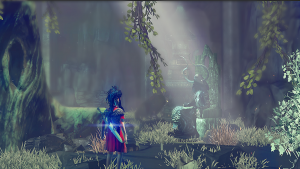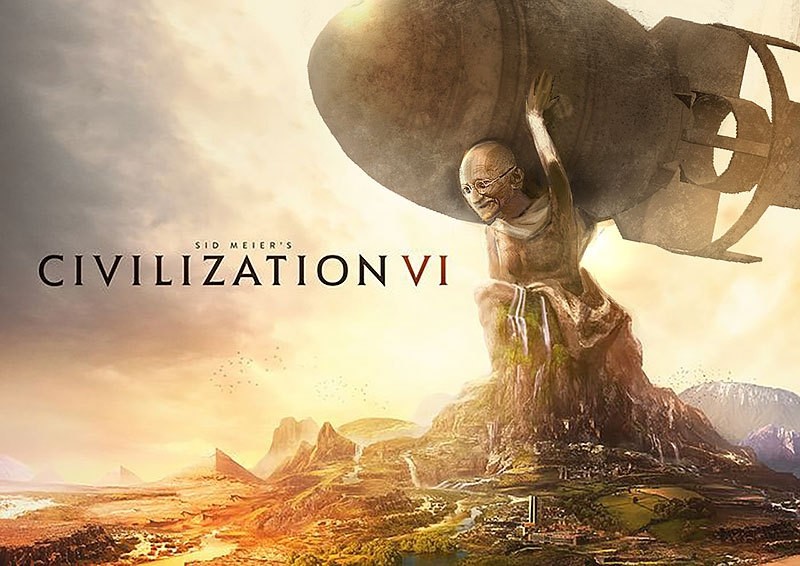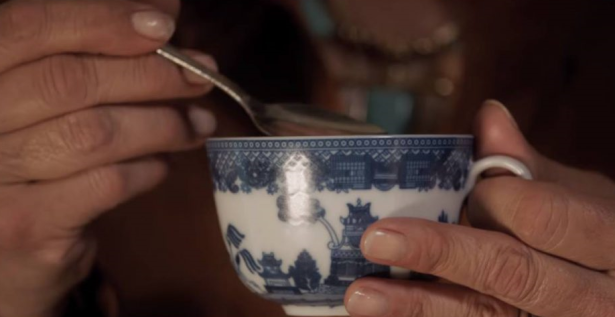I have spent a lot of my last 40 years playing adventure games. Text based adventure games, monochromatic adventure games with crazy little pixelated figures that “moved” from screen to screen along with the story, 8-bit, 16-bit, cel shaded, PC, console, mobile…you name it. Lots of them. More of them than I care to admit. Some of those games have been better than the others. The King’s Quest games I remember because they were my first “real” games with pictures on my ancient Tandy computer. And point and clicks will always have a spot in my heart, Grim Fandango for it’s noir style and quirky humor and The Longest Journey for showing me what a strong female protagonist could look like (and that queer folks could exist in games).
So when I saw the beautiful pictures of Swordtale’s Toren in the PSN marketplace I got a little giddy. An adventure game with a female protagonist, set against a lush tropical backdrop, based on Brazilian “myths”, developed by a small indie Brazilian company that promised that we would be able to watch the protagonist grow from birth to adulthood. What is there not to love about a game like that? I did some quick internet hunting around to see what I could learn about the company and the development team itself. Call me a cynic but I really wanted to know how diverse the team itself was or what steps they had taken to insure that the representation in the game was as diverse as they were claiming. I found it a little odd that while I could find a site for the game itself I couldn’t find anything for the studio. Since they seem to be fairly new and this is their first (?) game I gave them a pass and dived in. It was only $10 so how much did I really have to lose?
 Let me start by saying that the music and the art style in this game is absolutely amazing. The use of vibrant colors against lush backdrops to convey the tone of the story itself was (almost) enough to make me forgive the muddled textures in the game that sometimes made it impossible to distinguish one type of tile from another. And that’s something that’s unforgivable when that distinction is the thing that keep you from falling toward a pit of lava. Luckily the game is extremely forgiving and walking off of the edge of a tile usually means that you just drop down and grab the edge rather than plunging to your death. The music in the game often become a character itself. It is beautiful, well performed and tells as much of the story as the narrator’s psuedo-foreign, gibberish voiceover that I personally found made it harder to focus on the captioned text because I was exerting too much effort trying to discern what language it could have passible been (or might have even been based on). And I have to admit that those captions are the only thing that are really going to help you follow along with what is often a confusing narrative.
Let me start by saying that the music and the art style in this game is absolutely amazing. The use of vibrant colors against lush backdrops to convey the tone of the story itself was (almost) enough to make me forgive the muddled textures in the game that sometimes made it impossible to distinguish one type of tile from another. And that’s something that’s unforgivable when that distinction is the thing that keep you from falling toward a pit of lava. Luckily the game is extremely forgiving and walking off of the edge of a tile usually means that you just drop down and grab the edge rather than plunging to your death. The music in the game often become a character itself. It is beautiful, well performed and tells as much of the story as the narrator’s psuedo-foreign, gibberish voiceover that I personally found made it harder to focus on the captioned text because I was exerting too much effort trying to discern what language it could have passible been (or might have even been based on). And I have to admit that those captions are the only thing that are really going to help you follow along with what is often a confusing narrative.
As for the narrative itself, you play a young female protagonist aptly named Moonchild who is charged with climbing to the top of a tower (Toren) to kill the dragon who lives there and allow the sun to leave it’s everlasting position there and return cycles of day and night to this world. I don’t want to give spoilers so we’ll let it suffice to say that humans are the cause of this cyclical delay. While one of the things that was most appealing to me about this game was the fact that Moonchild was a female character, but I was ultimately disappointed that all of the supporting characters around her this far are male, her spirit guide who skeletal remains she sits before throughout the game and the knight who guides her actual quest and battles and is only visible through telescopes in game as he rides through the sky. I should add that this was one of the buggiest portions of the game because of the two times that I had to use the telescope in the first hour of game play the game crashed and had to be restarted. Luckily the action itself registered after the reboot so I didn’t have to do it again. This inclusion of an all male supporting cast simply made it feel as if Moonchild as a girl child was just there when there seemed to be so much narrative “money left on the table”. This is further illustrated by the fact that Moonchild seems to be born of nothing. And lest we want to say perhaps she is the moon itself fighting for her return to the sky, the game seems to imply something else because each time that she is born or reborn (if you die) we find the newborn Moonchild laying in a pool of post partum blood with no sign of a womb from which she emerged.
Mechanically the game also leaves a lot to be desired. On top of the crashy glitchiness of the telescopes I also found that Moonchild sometimes felt like she rubberbanded a bit when she she walked around and finding yourself turned around and going in the wrong direction (or trying to escape enemies) can be more than a bit frustrating. The controls also left a lot to be desired in that I found myself yelling “move faster” or “stop” more than usual as she didn’t always respond to the controls in the way that I expected. This is equally problematic during dream sequences when you are expected to trace the outline of symbols using a little jar of sand and the controls don’t respond in the way that they should. And while I recognize that I am a seasoned adventure/puzzle game player I found that many of the puzzles that you are expected to complete in order to advance the narrative were just too simplistic. Overall, the game just feel unfinished. While you can definitely see the enormous possibility present in this game it falls short. I would have loved to have been able to sing the praises of this game and to tell everyone to rush out and buy it, but I would say wait for an update. I would love to see this game eventually become a PS+ free game so that more people can (and would) actually experience the possibility.




